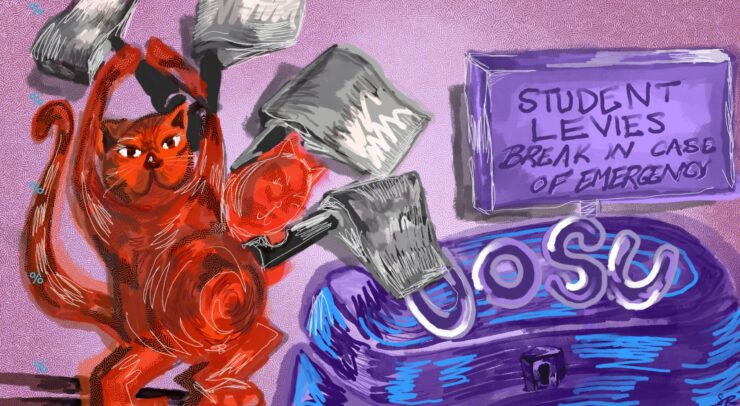We spoke with two UPROAR artists about moving their artistic practice online and making theatre in Ottawa.
As with most things in the time of COVID-19, Ottawa’s UPROAR Art Fest migrated online this year, bringing with it digital presentations of new plays, panels, and musical performances.
UPROAR, described by organizers as “a new multidisciplinary arts festival showcasing works by cis & trans women and non-binary artists in Ottawa”, ran its second year of programming from Sept. 10-12. The festival took place on Facebook Live, offering to online audiences a diverse, inclusive blend of new work.
We checked in with Chelsey Fawcett, a University of Ottawa MFA directing student and local director and playwright, and Victoria Luloff, artistic director of Petulant Guppy Theatre, to talk about their shared panel at UPROAR as well as their individual practices.
From March to August, Fawcett has been in what she described as a “flux” of designing and redesigning her shows based on the parameters that U of O has allowed and not allowed in person.
“It’s been a process,” she says.
However, Fawcett has been keeping a positive attitude given the circumstances, and acknowledges that she is lucky to be able to create art during this time.
“I’ve told my actors three things: let’s be safe, and once we feel like we’re safe, that’s when we can relax and be creative and have fun.”
“I’ve just been reminding myself and my team that yes, we are doing art in a very strange time, but every obstacle is an opportunity we can be innovative with and have fun,” she explained.
Fawcett’s play Haram premiered at the UPROAR festival on Sept. 10. Fawcett describes the piece as “a one-woman dance show,” with a combination of narrative and dance adapted into film. It tells the story of one woman’s journey through the world of belly dancing and her spiral downward as she tries to be successful.
The semi-autobiographical piece is inspired by stories from women Fawcett has encountered around the world.
Haram explores the full scope of feminine power, narrative, sexuality, exploitation, and objectivity present within the world of belly dance. The piece also delves into the art form’s incorporation of Western influences, as well as the subsequent ramifications of such practice.
Meanwhile, fellow local artist Victoria Luloff has been hard at work developing her upcoming play, The Dig. The piece explores the idea that “dignity is offered on a sliding scale” depending on how willing individuals are to conform to social expectations.
“It’s not a piece suited to digital experience, so I’m holding off on it for now,” says Luloff. She’s been rehearsing the piece in person (six feet apart), and is saving it for a future when in-person theatre is viable.
That said, the new digital normal isn’t all bad; Luloff, proposed to the Fulcrum a future of theatre in which online and in-person events can co-exist, citing Ottawa’s Fringe’s Pop-Up Patios as an example.
“Ottawa needs accessible spaces: why not hold events outside and online while we renovate our outdated spaces?,” she suggests. “We can temporarily compensate for inaccessible venues with these new practices that have become normal: UPROAR’s online ASL interpretation is a great example of that.”
Both Fawcett and Luloff collaborated on “Making Theatre in Ottawa”, a conversation moderated by Clary Chambers, covering a range of hot topics in the Ottawa theatre community. These included the Canada Council’s new policies on providing grant feedback to the troubling tendency for Ottawa artists to migrate to bigger, more artistically prolific cities like Toronto.
The UPROAR panel also touched on the pain COVID-19 has imposed on the Ottawa theatre community en masse: artists have lost the ability to connect in a shared space, and have noticed their artistic language shifting towards more digital poles.
As well, the age-old question “why this play now?” carries with it a shifted new gravity: dramaturgy bears little strength against the enormity of a global pandemic. Fawcett referenced the digital migration and its associated issues in staging her five-years-in-the-making play, Haram.
“Stage directions are backwards on Zoom. Internet connections cut out. It’s a whole new struggle,” said Fawcett during the panel.
The panelists also touched on the emotional perseverance necessary from the Ottawa theatre community during these times.
“There’s a new internalization of the weight of the world demanded by these new circumstances. But 2020 has also shown the support, bravery, and action present in the Ottawa theatre community, which is encouraging”, says Luloff.
You can learn more about Chelsey and Victoria’s work HERE.





